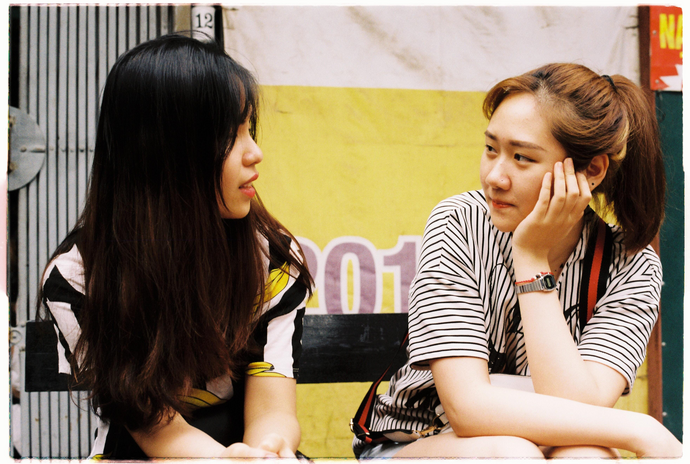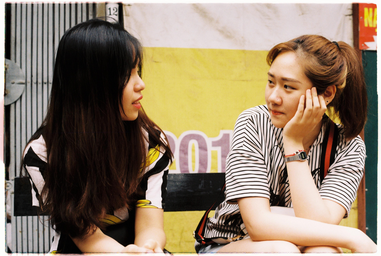There seems to be a misinformed stigma in the present time, about the late 20th – early 21st century (Born in the 1980s to present-day) youths and young adults having an easier time than the previous generations. I’m talking about Generation Z here and maybe Millennials who can relate to this stigma. Where the previous generations would often say that we didn’t have to experience the hardship that they had to undergo. Starting the conversation with “Back in my days” and ending it with the assumption that the younger people of today are having a much easier time. We are regarded as the generations that have been handed down the technological advancement that our predecessors have created; communication and information made easier through the internet, phones, emails and social media platforms; transport made faster through the development of cars, aeroplanes, trains and ships. Being born in the age of rapid technological advancements have made the opposite ends of the earth much closer than it seems. In addition to that, we are also involved in numerous social changes built upon the foundation laid by previous generations. Matters like mental health issues have been institutionalised and normalised as a topic of discussion for the general public. Feminist movements have championed equal rights in all social aspects of life. Debates on civil rights for different gender and sexual identities have opened up. These monumental changes have occurred within a few decades due to the fruits of our parents’ labour.
To a certain extent, we can agree that the youths (including the young adults) were able to partake in the benefits of these changes. This has brought about the idea of youths having a much easier time at the present day. And this idea has led the late 20th – 21st-century youths to be generalised as a “strawberry generation” — a generation who cannot withstand any form of ‘social pressure or hard work’ without bruising up like a strawberry. And that is where the issue lies: in simplifying a whole generation of youth’s experience by comparing “our parents’ hardship” to “our hardship” when that should not be the case at all. Because trials and tribulations come in different forms; it is easy to forget that every generation is a bearer of the positive and negative repercussions of the previous generation. And we’re definitely not excluded from that recurrence.
Emphasis on youth
Being young is good. It allows you to travel more, do more and be more. It opens up opportunities in your career, your relationship with people and your own personal achievement. Hearing your elders question “how hard can it be to “be young” in this day and age of endless opportunities and easily accessible information?”
Questions framed by the differences in opportunities that they had in school, in their career and ambitions, build a sense of envy and expectation towards the youths in a much different position. However, this perception of youth seems to only glorify the experience of being young and brushes over the struggles that they have experienced. Beginning with…
Growing up in the media culture
Have you ever felt overwhelmed by the amount of information available on the internet? Feel a compelling standard to portray a “perfect” life on social media and a moral sense of responsibility to participate in countless global affairs? Nia Getfield have talked about this tendency of youths to look at life through a rose-coloured glass on social media. Where the quality of living has become contingent on the way you portray it online. It becomes a habitual practice to post about a day out with yourself, your friends, family or lover; omitting the underlying nuances of the day that didn’t go as planned. It could be a miscommunication or disagreement that you had over a certain topic or decision. “Drive faster; no drive slower”, “let’s split the bill; no let’s pay for ourselves instead.” Maybe a few mishaps have happened along the day. “Let’s go cycling; change of plans it’s raining” and yet, the hashtag of the post is #happy #fun #weekendouting. And if our life starts to feel a little bit mediocre, we’ll have social media to compare ourselves to.
On top of that, the constant exposure to global news has increased our social and moral responsibility towards the world. Reading about the Hong Kong protests, China’s ‘re-education’ camp for the Uyghurs , GE2020, Black Lives Matter movement, COVID-19 pandemic. We start to feel a need to contribute globally through donations, media engagements, debates and social movements. And the media culture becomes a source of excessive standards placed onto the youths, where the lack of participation in current affairs paints you out to be an ignorant and selfish individual.
The empowerment that we advocated for others and our own lives began to burn us out. Some of us start to feel a sense of misery towards life from the negative events occurring across the world. It doesn’t help that we have also allowed the pressure of living ‘an optimal life’ portrayed in social media to permeate into our life. So our happiness and validation have become reliant on the media culture, turning into a way of living for many youths.
What does it mean to be a qualified youth?
Have you ever been told that you are still young and there will be plenty of opportunities out there waiting for you? That being young was a bonus qualification for entering a company. But in reality, companies looking for this type of qualification uses a youth’s inexperience to capitalise on the amount of work that they have to do. Youths are often subjected to low wages and long working hours. For example, my friend who was working as a tuition admin, shared with me about her experience where the younger part timers were paid $8/hr while the senior part timers were paid $10/hr based on the differences in their experience. I also remember working in a FnB and retail industry from 8am-6pm for a salary of $5.50 to $7/hour at the age of 15; tasked to do more than I was required to. Going into my 20s, I started to look for a full-time job with better wages and work progression. As one would expect, the entry requirement for these jobs have become more “sophisticated.” Elements of qualification included your educational grades, level of certification, extracurricular participation, a broad social network, practical work experiences, specialised skill sets and any form of personal or professional achievements. All of a sudden, you’re expected to be young and accomplished to differentiate yourself from everybody else applying for the job. And this has become the bare minimum standard for youths entering the workforce.
Being young has opened up a lot of opportunities for youths but the implication of it in the 21st century means that the standard of expectation has also been elevated as a whole. And those who cannot meet that expectation struggle with their feeling of inadequacy.
‘If the culture doesn’t work for you, don’t buy it’ – Mitch Albom
The pressure of being young is immense. Not just within our generation but across all generations. Being young and inexperienced, in many ways, have made us more vulnerable to external influences. We face countless hardships and deal with them in our own way, hoping to become wiser in time and experience. And like what Morrie Schwartz said to Mitch Albom, “If the culture doesn’t work for you, don’t buy it.” If the act of scrolling through social media, looking at other people’s portrayal of their own life or absorbing the state of affairs in other countries demoralizes you, don’t buy it. If the pressure of being young comes with the implication of achieving many things; feeds into your feeling of inadequacy, DON’T BUY IT.
Learn to create your own subculture within the culture that you are living in. What are the things that really matter to you and make you feel better (emotionally, mentally, physically, ) in the long run? This doesn’t mean that you have to cut yourself off from the use of social media or involvement in global affairs, it just means that you have to be better at filtering out things that don’t matter to you as much. Pick the top 2 – 3 things that you want to focus on; does it contribute to your emotional, mental and physical health? Focus on building your own little subculture and form your own identity. We are not superheroes, we should not feel an obligation to meet everyone’s expectations. Neither should we put ourselves down for having a more “difficult time” when being young is difficult in it itself. Best of luck to the youths.



